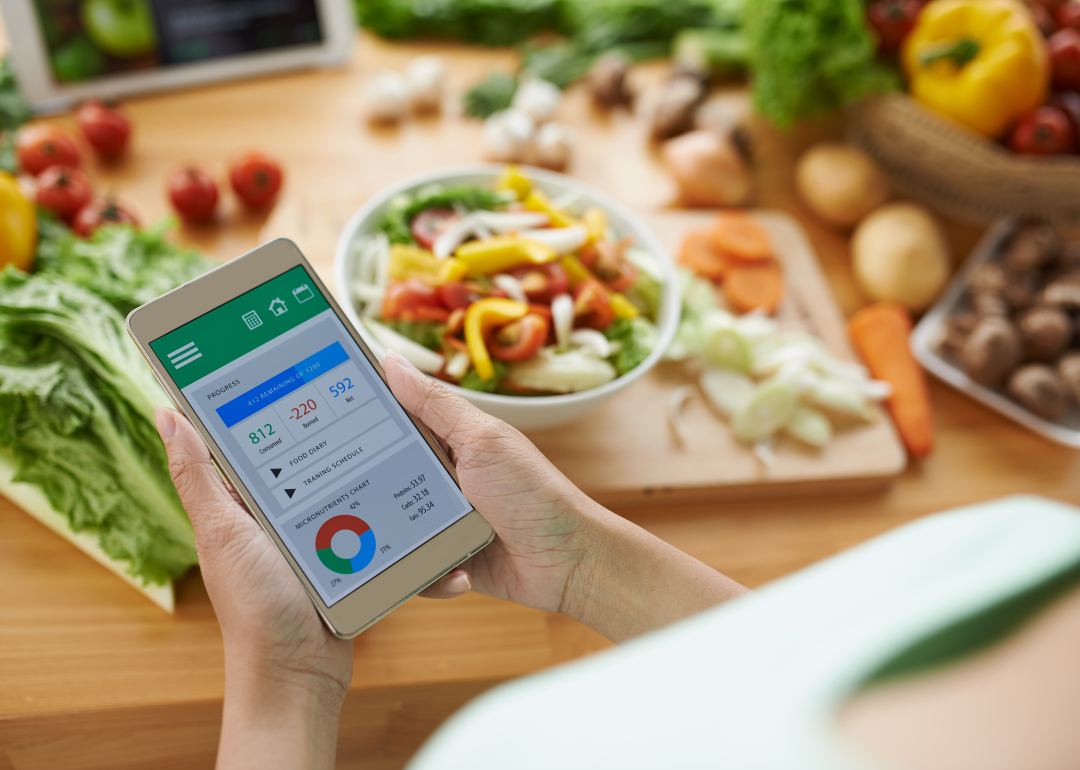6 tips for eating more mindfully

G-Stock Studio // Shutterstock
6 tips for eating more mindfully
A spread of food on a rustic wooden table
It’s easy to get distracted and rush through life. Between constant smartphone notifications, work emails, family obligations, and the never-ending scroll on social media, it’s no wonder the world is constantly operating in a state of hurry. Unfortunately, our eating habits tend to reflect that. With numerous fast food options and the ability to order anything you want with the click of a button, our meals are just as rushed as the rest of our life, which ultimately causes distress to our bodies.
To start a mindful eating practice of your own, Thistle compiled six tips for eating more mindfully from a variety of experts and news sources. Mindful eating is a practice that helps minimize the constant stream of responsibilities we deal with day-to-day while we eat. Instead of shoveling food into your mouth at your desk, mindful eating challenges you to slow down, take a break, and focus on the food in front of you. This practice can benefit digestion, lead to wiser food choices, and help with identifying your satiety (i.e., fullness) cues.
It’s important to note that mindful eating doesn’t replace traditional treatments for conditions such as eating disorders. It is also not seen as a weight loss strategy on its own, but can help complement a weight loss program if someone wants to change their eating habits and lose weight in the long term.
![]()

Elena Yakusheva // Shutterstock
Start with a small portion
A small portion of seafood pasta.
Portion control can feel challenging and restrictive, especially when your “eyes are bigger than your stomach.” Thankfully, many associations provide methods for consumers to follow that allow for easier portion control.
Precision Nutrition offers an easy guide that teaches you to properly portion your food by measuring with your hand. The American Diabetes Association teaches the Diabetes Plate Method where consumers fill half their plate with nonstarchy vegetables, a quarter with protein foods, and a quarter with carbohydrate foods. They also suggest using smaller plates (like 9-inch lunch plates) instead of larger dinner plates to easily control portions. While this may seem like a small amount at first, the British Heart Foundation suggests waiting 20 minutes after consuming your plate before filling it again.

EvgeniiAnd // Shutterstock
Eat slowly, chew thoroughly
Two young boys eating pizza and pasta.
The 20-minute mark isn’t just a random number—it actually takes your brain 20 minutes to send signals of fullness from a meal. Harvard Health suggests setting a timer for 20 minutes while you eat, to give yourself a sufficient amount of time to enjoy the meal.
Experts suggest chewing each bite 30 times to really savor it (studies show chewing thoroughly aids digestion), and to put your fork down in between bites to elongate your mealtime. If you’re still hungry after 20 minutes, you can go for seconds.

fotokalua // Shutterstock
Savor your food and think about its importance
An older man savoring his meal.
An easy way to peel off distractions and focus on your meal is to think about the food specifically. Research from the American Diabetes Association suggests thinking through a series of questions: What did it take to bring this food to you? Who grew this food? Who cooked it? What tastes and sensations am I experiencing?
As the meal continues, ask yourself questions to gauge your satiety while eating: Have I had enough? Am I still hungry, or am I simply still eating because this tastes good? You can always save your food for later. It’s also important to eat before you get too hungry to avoid overeating and impulsive choices.

Africa Studio // Shutterstock
Take time to gauge your hunger level before eating
A woman deciding what to eat from the fridge.
Hunger cues don’t just come from a rumbling stomach, but can actually present themselves in different ways. Low energy levels, headaches, shakiness, nausea, and even problems focusing can all be signs of hunger.
The University Health Services at Berkeley created a Hunger-Satiety scale that allows eaters to evaluate their level of hunger from 1 (starving, feeling very weak) to 10 (extremely stuffed, nauseated). Use this scale to evaluate how hungry you are before consuming a meal and when to stop so you aren’t uncomfortably full. This allows you to have a better sense of your satiety cues and strengthens that mindful eating practice over time.

Dragon Images // Shutterstock
Keep a calorie budget in mind to avoid overeating
A woman using an app that counts calories.
For those who think in numbers, having a set calorie budget can help you practice more mindful eating each day. While calorie counting does not work for everyone (especially those looking to heal their relationship with food and restrictive dieting), it can help those wanting to learn more about the food they eat. However, it is important to note that 2017 research from Perspectives on Psychological Science shows reducing calories does not always equate to losing weight long term.
Harvard Health pointed out in 2020 that food quality is important, focusing on getting enough satiating foods that are high in protein, healthy fats, and fiber vs. ultra-processed foods filled with empty calories.

Mcimage // Shutterstock
Don’t multitask during meals
A toddler eating vegetables.
It is difficult to gauge your hunger-fullness cues when you are distracted by watching TV, scrolling on your phone, or working on your computer. While eating during work can seem efficient, experts at Harvard Health said it distracts you from understanding how full you are, causing you to overeat and feel uncomfortably full later. This can lead you to feel lethargic after a meal instead of energized, and The American Journal of Clinical Nutrition found in 2020 it doesn’t give you a chance to actually taste and enjoy the food in front of you.
One easy tip is to sit down at a table or a designated spot for eating to give yourself the space to practice mindful eating, according to Dr. Carolyn Dunn, a dietician and weight loss expert.
This story originally appeared on Thistle and was produced and
distributed in partnership with Stacker Studio.